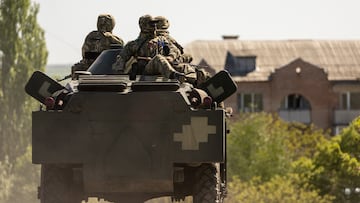US passes intelligence to Ukraine: What have they shared? Russian generals...sinking of Mosvka
It has become clear the US is passing critical military intelligence to Ukrainian forces, some worry about how this will be interpreted by the Kremlin.


In late April, when Ukrainian forces sunk the largest warship in Russia’s naval fleet on the Black Sea, the Moskva, the world was surprised.
Even the Russians have yet to admit that the Ukrainians were responsible for the ship’s sinking, instead of blaming the loss on an ammunition fire onboard.
The ability of the Ukrainians to identify and launch their attack so swiftly led many to believe that the United States provided intelligence to confirm the ship’s position. This week, NBC News reported that intelligence from the US had been shared with the Ukrainians before the sinking of the Moskva, raising worries about how Vladimir Putin will respond.
This news comes after the Pentagon confirmed that it has passed intelligence to Ukrainians to target high-level Russian military officials. In relation to the sinking of the Mosvka, the White Hosue and the Department of Defense have given a partial denial that their intelligence played any role.
During a press conference from the White House on 5 May, Jen Psaki said that the US reports were “inaccurate” and that no “specific targeting information for the Moskva” was provided.
“We were not involved in the Ukrainians’ decision to strike the ship or in the operation they carried out. We had no prior knowledge of Ukraine’s intent to target the ship,” said Psaki.
Then, the message took a bit of a turn with the Press Secretary said that the US has and continues to “provide a range of intelligence to help them understand the threat posed by Russian ships in the Black Sea and to help them prepare to defend themselves against potential sea-based assaults.” This back tracking leaves the question of whether or not the US informed Ukrainians about the ship’s position. Psaki’s comments were meant to downplay the importance of US intelligence, adding that it is just one source that is combined with others that the Ukrainians “have access to.”
The messaging from the White House seems to tell a conflicting story.
On the one hand, they did not know anything about the attack on the Moskva, and on the other, they may have helped to provide information as it its naval position. It is not to say the US directed the attack, but it is not out of the realm of possibility, knowing the weapons available to Ukraine, that this sort of attack would be launched.
From the Pentagon, spokesman John Kirby struck a similar tone. During a press conference last week, Kirby said that the Department of Defense does provide the Ukrainians with what they “believe to be relevant and timely information about Russian units that will allow them to adjust and execute their self-defense to the best of their ability.”
Kirby also described the information passed to Ukrainian forces as “lawful” and “limited,” and in lock step with the White House noted that the role of US intelligence is overblown, saying that the Ukrainians have “been fighting this war against Russia for eight years.”
“It’s not like they are completely blind to the way Russia organizes itself and the way that Russia conducts itself on the battlefield.”
The US provides intel to help Ukraine target Russian generals
Last week, the New York Times reported that various US military officials, who wished to remain anonymous, confirmed that the US had been passing intelligence on the Russian troop movements. While the intention of sharing the intel was not to target high-level Russian officials, those interview by The Times, noted that the Ukrainians had used it in such a manner.
Related stories
There have been no figures released as to how many leaders have been killed by US intelligence, but they did say that some of the positions have been identified through the use of “classified and commercial satellites.”
Some of the officials interviewed are concerned that the US actions could be interpreted b Russia as a direct intervention in the conflict and thus lead to a serious and possible fatal escalation in the fighting.

